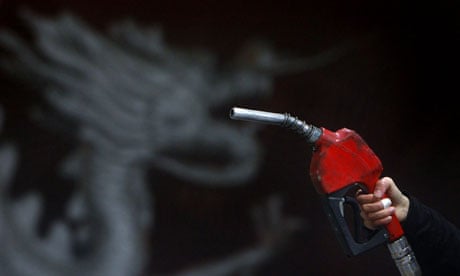Hidden behind thickets of acronyms and gorse bushes of detail, a new great game is under way across the globe. Some call it geoeconomics, but it's geopolitics too. The current power play consists of an extraordinary range of countries simultaneously sitting down to negotiate big free trade and investment agreements. One way of thinking about this is to see it as the Widest West Web, though a definition of the west that includes Japan, Peru, Brunei and Vietnam is wide indeed. Another way to describe it is EBC: Everyone But China.
The biggest of these negotiations got under way this week, as a European commission delegation sat down with its US counterparts in the White House Conference Centre in Washington DC. The deal they're trying to thrash out is currently called TTIP, for Transatlantic Trade and Investment Partnership. That's a terrible acronym. (Want to be on the TTIP anyone?) The first thing those negotiators should do is to change the name. TAP, for Trans-Atlantic Partnership, is a much better alternative.
TAP would then neatly complement TPP, for Trans-Pacific Partnership, the other biggest show on the Broadway of geoeconomics. Total transatlantic trade and investment is estimated to be worth around $4.7 trillion. The proposed TPP region, a diverse grouping currently slated to include the US, Canada, Mexico, Australia and Japan, as well as such towering market democracies as Vietnam and Brunei, accounts for about one third of world trade. There are also ongoing EU-Canada and EU-Japan negotiations, while both the US and the EU are trying to intensify their trade and investment relationships with countries such as India and Brazil.
With glorious can-do American optimism, the White House is describing its big push to get the US on the TTIP – soon, I trust, to be renamed TAP – as a job for "one tank of gas". That apparently means the period up to the Congressional midterm elections next year. Well, they have big petrol tanks over there, although it has also to be said that, like your all-American SUV, the US Congress does pitifully few miles to the gallon. On the European side that period would take us to the end of the current European commission and parliament. Most of the other talks, including those on TPP, EU-Canada and EU-Japan are also looking towards 2014.
It may never happen. The recent history of trade talks is a history of stalling or, to stay with the Obama administration's metaphor, of running out of gas. The fact that most of the countries involved are democracies only makes it more difficult. The way contemporary democracies work, they excel in aggregating the special needs of interest groups, both monied interests (corporations, sectoral lobbies) and electorally important ones, such as farmers. And the EU is itself an aggregation of 28 such national aggregations. It is no accident that Brussels competes with Washington for the title of lobbyists' nirvana.
But just imagine that, with politicians' minds unusually focused by years of global recession and the rise of China, it did all come together. This would be huge in two ways: a huge potential gain for the world economy, and a huge challenge to China. To mark the centenary of 1914, we would be getting back to something like the free-trading world we had before 1914 – but on a larger scale, with less formal colonialism, and with more complex and deeper forms of interconnection.
Not everyone would be a winner, even inside the Widest West Web, but the potential benefits are enormous. The economists' projections must be taken with a large pinch of salt, but just to give you an idea: according to a study commissioned by the Bertelsmann Foundation, the TAP – or TTIP, if you still insist – could mean a long-term increase of more than 13% in GDP per capita for the US, and average real income growth per capita of 5% for the EU – with no less than 10% per head for the UK. The European commission estimates that an EU-Japan deal alone could result in the creation of 400,000 jobs. For a European Union that has nearly 6 million unemployed young people, that is not nothing. Done right, the expansion of free trade and investment is about as close as we get in human affairs to a win-win. So turn on the TAP, I say, and all those other faucets.
But this is also, let us not kid ourselves, a geopolitical challenge to the Chinese Communist party. For in the geopolitics of free trade, Dr Pangloss meets Machiavelli. Americans know this. (It's one of the things some of them like about it. Irwin Stelzer writes that trade "is politics, and war, by other means".) Europeans know it. The Japanese know it. (Japan's prime minister, Shinzo Abe, says joining the TPP will contribute to Japan's "security".)
The Chinese know it too. An article in the Washington Quarterly by Guoyou Song, of Fudan University in Shanghai, and Wen Jin Yuan, of the University of Maryland, reports a "strong voice in Chinese academic and policy circles" characterising TPP as an American tool to contain China's rise. Yet the conclusion of their very sober analysis of the many interests and lobbies shaping Chinese policy is intriguing: "It is worth pointing out that China has not closed its doors towards the possibility of joining TPP itself. If the Chinese government feels that the benefits of joining outweigh the costs, then China may indeed apply."
This is where the economic Pangloss and the political Machiavelli could actually combine, in a way that is – if Chinese communists will pardon such an old-fashioned expression – dialectical. The Widest West Web is a challenge to China, but it is also an incentive to China. If China were to decide that it wanted to join a network of proper free trade and investment areas, and actually play by the rules, and we were then to say no, we would be behaving almost as irresponsibly as European leaders did in 1914.
Our ultimate objective in this new great game must not be an EBC bloc. Rather, these free trade areas should all be seen as building blocks of a liberal international order that could include and embrace China. China would obviously then have a right to shape that order, alongside western powers, but its participation would also eventually help to move China domestically towards more openness, pluralism and rule of law, as desired by a growing number of its own people. Welcome to the dialectics of TAP and TPP.
Twitter: @fromTGA

